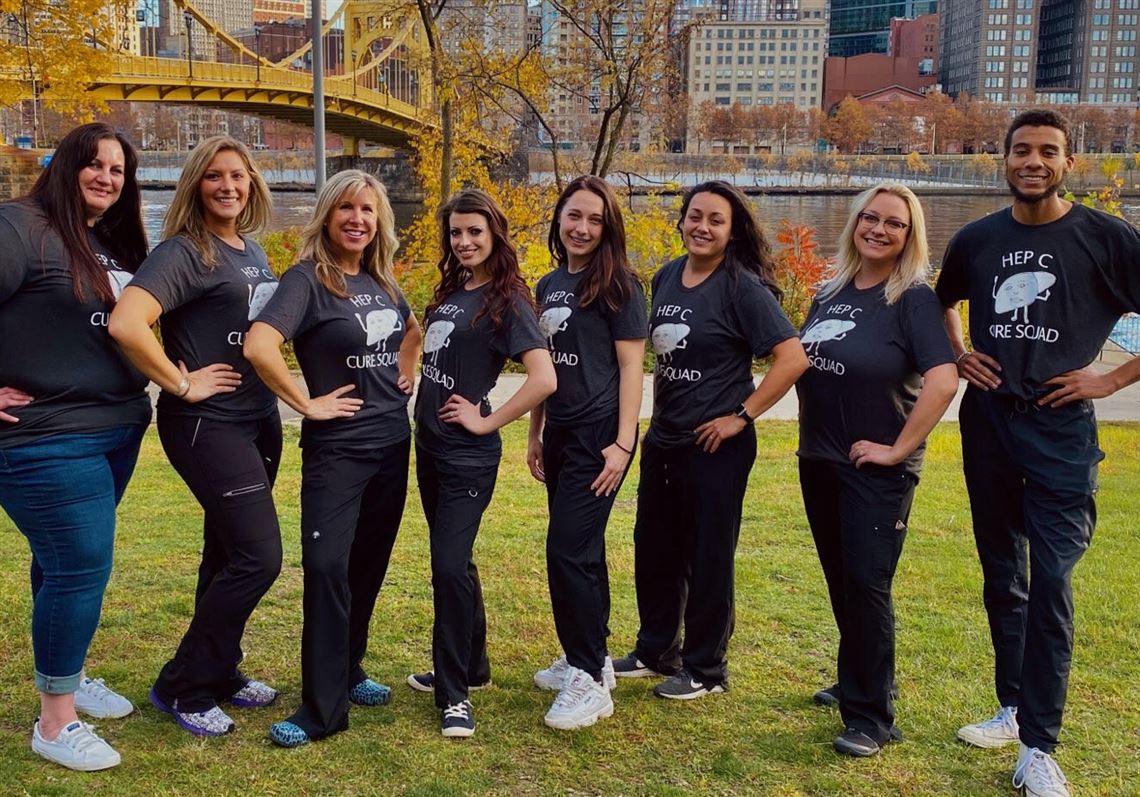While hepatitis C is curable, treatments as simple as a course of medication are not reaching the majority of people who need them, a recent report from the U.S. Centers for Disease Control and Prevention found. Inaccessibility to treatment is an issue in Allegheny County as well, with local experts pointing to growing rates of the infection.
Hepatitis C is the leading blood-borne pathogen in the U.S., according to the CDC. It is spread through blood-to-blood contact, often through infected needles and occasionally through sex. It is estimated that 2.4 million people in the U.S. have hep C, which can go undetected for years due to a lack of symptoms.
The consequences can be dire. If left untreated, the infection can lead to liver cirrhosis, or scarring, end-stage liver failure and liver cancer, and it is the number one cause of liver cancer. Per CDC data, 14,863 people died from hepatitis C in 2020, about the population of Wilkinsburg.
Pennsylvania had the 14th-highest rate in the country of chronic hep C infections in 2020, and officials think numbers have only increased since the pandemic. Neighboring state West Virginia had the highest rate in the country that year, per CDC data.
The barriers to accessing hep C screening and treatment are many, as the most vulnerable to being infected include people who use drugs intravenously, the unhoused and those in correctional facilities. A lack of transportation, insurance obstacles, state restrictions — which have eased up in Pennsylvania — and stigma associated with drug use all put up hurdles.
In April 2020, the U.S. Preventive Services Task Force and the CDC recommended that every adult 18 or older get screened for hep C in their lifetime, but physicians worry that not enough people know about the guidelines due to the urgency of the pandemic eclipsing them. There is no vaccine for hep C, increasing the necessity for screening.
Dr. Divya Venkat, co-director for the River Clinic at the Allegheny Health Network Center for Inclusion Health and the medical director for the Prevention Point Pittsburgh Medical Mobile Unit, said she’s seen increased rates of hep C infections in the community in the past few years. According to Allegheny County Health Department data, rates of chronic hep C have decreased since 2017, although the report notes a likely trend of vast underreporting due to the pandemic.
Acute hep C occurs within the first six months of viral exposure. In some people, the virus clears on its own, but many other cases become chronic, leading to serious health conditions.
Antivirals to treat hep C can effectively cure both acute and chronic cases, even when a person has had the disease for a decade. Epclusa was approved by the Food and Drug Administration in 2016 to treat hep C and Vosevi was FDA-approved in 2017, both delivered in 12-week courses. Another drug, Mavyret, was approved by the FDA later that year for an eight-week course. These treatments come in the form of once-daily pills and typically clear the virus completely from a person’s body if taken as directed.
“We have a much younger population now who don’t interact with the health care system frequently,” Dr. Venkat said.
This aligns with the recent CDC report, which shows that hep C cure rates decrease for younger patients and patients who are on Medicaid.
But insurance coverage still represents a meaningful barrier to patients seeking hep C screening and treatment. Mavyret costs $13,200 for a four-week supply out-of-pocket.
Those most vulnerable to the infection often don’t have primary care providers, resources to apply for Medicaid or means to pursue state-run coverage such as Pennsylvania’s Pennie.
These populations are not the only ones at risk, either. Those who received a blood transfusion before 1992, people who have received a tattoo or piercing from an unlicensed parlor, people who have shared snorting tools during drug use, and even patients on kidney dialysis are at risk.
“A lot of folks don’t even know what hep C is, how you get it, or that they could have it,” said Kathi Scholz, director of hep C outreach for Central Outreach Wellness Center. “They’re not using the medical system the way they’re using ERs.”
Yijia Li, a physician at the East Liberty clinic Allies for Health + Wellbeing and an infectious disease physician at UPMC Presbyterian Hospital, said he sees patients come into the hospital with bacterial infections in their bloodstream from dirty needles all the time. He called hep C the “silent killer,” because it replicates in the liver, sometimes without symptoms, until the liver develops scarring and stiffens.
Another potential barrier to accessing treatment is a lack of transportation. In order for a patient to access hep C treatment, they need positive bloodwork showing presence of antibodies as well as a separate confirmatory test showing viral load, which can take weeks. While the commonwealth did away with required and pricey genotyping testing (there are six types of hep C; the test confirms which type a patient has), Dr. Venkat said many insurance plans still require it.
“Testing is one of the most difficult parts of hep C treatment,” she said. “In a lot of the neighborhoods with high rates of hep C infections, there are not many medical clinics. … Where do patients go to get their blood drawn, and how do they do it quickly?”
Dr. Venkat said the Center for Inclusion Health has grant money available to help patients cover the cost of a bus pass or a Lyft if transportation is a barrier. Ms. Scholz, from Central Outreach Wellness, and Dr. Li, from Allies, said their clinics also have robust transportation aid for those who need it.
States can impose restrictions on hep C treatment that further prevent people from accessing services. Up until 2014, Pennsylvania required that patients have a severe amount of liver damage before accessing treatment; as of 2022, the state lifted any restrictions pertaining to liver fibrosis.
Some states require patients to submit proof of sobriety before accessing treatment. Up until 2017, Pennsylvania required that patients be counseled about drug and alcohol use before getting treated. A 2022 report shows no more sobriety restrictions in the state, but neighboring West Virginia still requires that patients receive drug counseling. Twelve states still require abstinence and mandatory enrollment in a substance use treatment program before accessing hep C treatment.
Pennsylvania just this month lifted a prior authorization requirement for hep C antiviral prescriptions. People who work with hep C-positive patients say this is already making a difference.
“We are processing 40 hep C patients a week who are starting on meds,” Ms. Scholz said.
Since her team, called the Hep C Cure Squad, began treating patients in Pennsylvania and Ohio in 2017, she says they have screened nearly 45,000 people and cured almost 10,000. In earlier days, she recalled, she was processing five or 10 patients a month. Right now, she said the population her team serves has a positivity rate of 44%. The team is able to draw blood and conduct blood tests on site, as well as write prescriptions for hep C treatment.
Ms. Scholz said they screened about 10,000 people in 2022 alone. Although 89% of those 10,000 (per office data) knew they had hep C, Ms. Scholtz said, those patients said they were not directed to resources after diagnosis.
“The prior authorization process being eliminated in Pennsylvania is huge,” she said. “We are getting patients meds five to seven days faster.”
Dr. Venkat had not heard about the Hep C Cure Squad, but she said it was “incredible” and “the kind of initiative we need.”
The Pennsylvania Department of Health Bureau of Epidemiology released an updated Viral Hepatitis Elimination Plan in May. The plan aims to raise awareness about viral hepatitis, increase access to hep C treatment, expand harm reduction services, monitor hepatitis cases and reduce stigma.
The state had previously received a grade of “C” for its efforts to eliminate hep C, a grade given by an independent governing body called the Hep ElimiNATION group. The group is a collaboration between the National Viral Hepatitis Roundtable, the Center for Health Law, Policy and Innovation at Harvard Law School, and the O’Neill Institute for National Global Health Law at Georgetown University Law Center. It grades each U.S. state according to its elimination efforts.
Pennsylvania’s grade increased to a “B” the following year.
“Pennsylvania released an elimination plan, which was a significant progressive step for the state,” said Sonia Canzater, the project director for the Hep ElimiNATION group and an adjunct professor of law at Georgetown University.
But in its grading, the state received just 1.5 points out of 8.5 for its harm reduction strategies. The plan does list intentions to reduce hep C by expanding harm reduction services, such as needle exchange sites, and by increasing education about harm reduction resources offered around the state.
Harm reduction is intrinsically tied to hep C, as many get the virus from intravenous drug use.
Pennsylvania’s track record here is mixed. While harm reduction strategies have been implemented in recent years, including the approval in 2022 of fentanyl test strips, the state Senate overwhelmingly passed a bill in May to ban supervised injection sites. Such sites allow people to use drugs under the watchful eye of medics and addiction medicine specialists. Ms. Canzater sees this as a missed opportunity in working toward hep C elimination.
Ms. Scholz echoed this: “We really need new harm reduction legislation brought forward if we have any change at all of getting a handle on hep C. People need clean needles.”
Supporters of the ban have argued that such sites only enable drug use.
Statistics from the two supervised injection sites in New York City and Vancouver, Canada, show that these clinics can help to reduce infections by providing people with clean supplies.
“Giving people the ability to use drugs in a safe way actually reduces infection,” Dr. Venkat said. “Drug use is a part of life, and people can and should be enabling others to live their lives in the safest way possible by mitigating harms around them.”
Correction: An earlier version of this story misidentified the project director for Hep ElimiNATION. She is Sonia Canzater.
Hanna Webster: hwebster@post-gazette.com
First Published: July 31, 2023, 9:30 a.m.
Updated: August 1, 2023, 3:07 p.m.



















